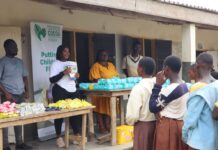
Rural teenage girls in Akyemansa District in Eastern region have marched against rising cost of sanitary pads in the country which they say is worsening period poverty among girls in rural communities.
The teenage girls held placards with varied inscriptions expressing their displeasure with a call on government to either scrap or reduce 20% luxury tax imposed on sanitary pads.
Period poverty is high among young girls in Akyemansa District as parents who are predominantly peasant farmers are unable to afford the monthly expenses for sanitary pads for their teenage girls.
While some of the teenage girls labour in farms for money to buy the product, others are influenced by men particularly Okada riders to trade sex for pads leading to high cases of teenage pregnancy.

Akyemansa District for instance recorded highest teenage pregnancy cases in Eastern region in 2021 but dropped to second position in 2022.
The march by the teenage girls for sanitary pads to be made affordable was in partnership with Ark Development Organization ,a non for profit organization implementing a UNICEF funded project dubbed “Safe and Protective Environment for Adolescent Development (SPREAD)” aimed at reducing teenage pregnancy menace in the district.
The teenage girls and the NGO presented a petition to the government through the District Chief Executive for Akyemansa Paul Asamoah..
The petition signed by Emmanuel Kwarfo Mintah Executive Director Ark Development Organization stated that , “We, at Ark Development Organization is petitioning the Government of Ghana through the DCE to reduce
or scrap the 20% luxury tax on menstrual products “.
The NGO argued that “Menstruation is not a luxury but a basic natural occurrence ascribed to females within the natural age that permits the process. The luxury tax on menstrual products exists in spite of a 12.5% Value Added Tax. The current economic state of Ghana post-the -COVID-19 pandemic makes menstrual products less
affordable for the vast majority of consumers.”

The petition also touched on the fact that,”menstrual products in the form of sanitary pads and tampons within the designated tax region are designed in commensuration to health and sanitary considerations. In effect, the aforementioned menstrual products are safer to use than older methods and must be safeguarded to reduce poor menstrual hygiene and menstrual-related-infections.The menstrual product tax exacerbates period poverty and negatively impacts the quality of life of
women by decreasing the accessibility of menstrual products. Without menstrual products, young girls and women may be embarrassed, thereby lacking the needed
confidence to effectively function in society.
The petition concluded that “Period poverty may negatively affect the economic and educational opportunities of girls and women involved.The difficulty in affording menstrual products may be a luring abode of teenage pregnancy and rape where young girls are vulnerable to dangerous coping mechanisms.We demand that the 20% luxury tax on menstrual products be reduced or scrapped before the end of December, 2023”.
The District Education Director Akua Ayisi corroborated that many female students in the district are being impregnated by men who support them financially to secure pads and other personal effects.
She however charged parents to be responsible in providing for basic needs of their children.
Source: Ghana/Starrfm.com.gh/103.5FM/Kojo Ansah



